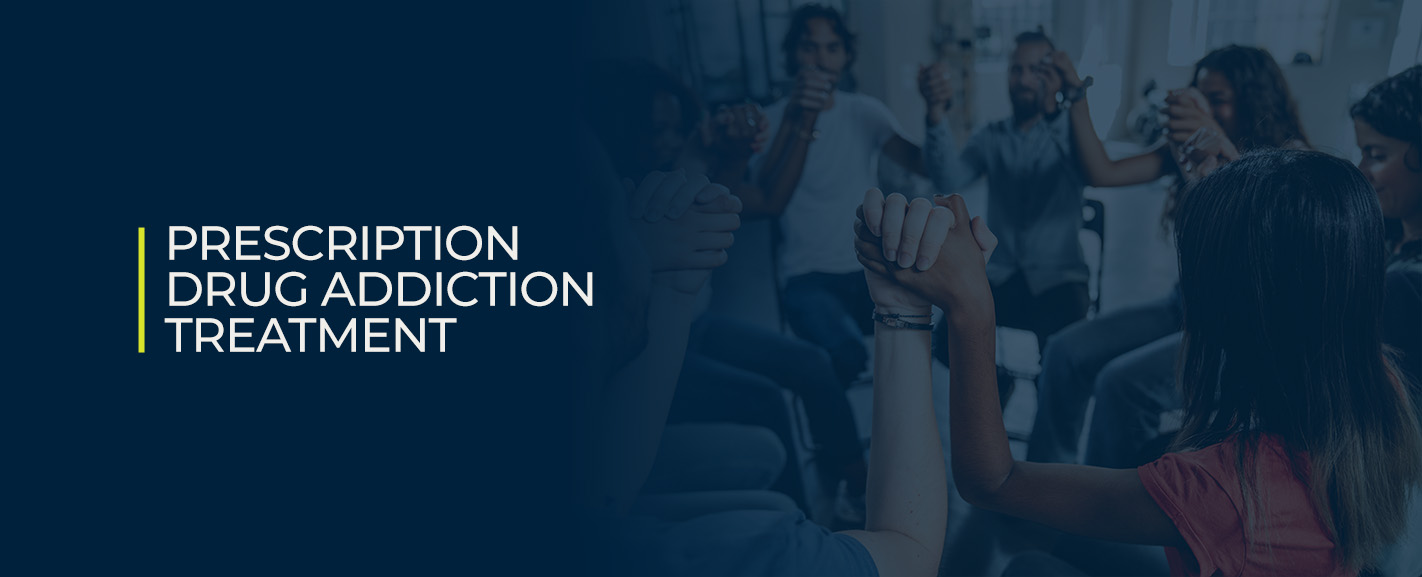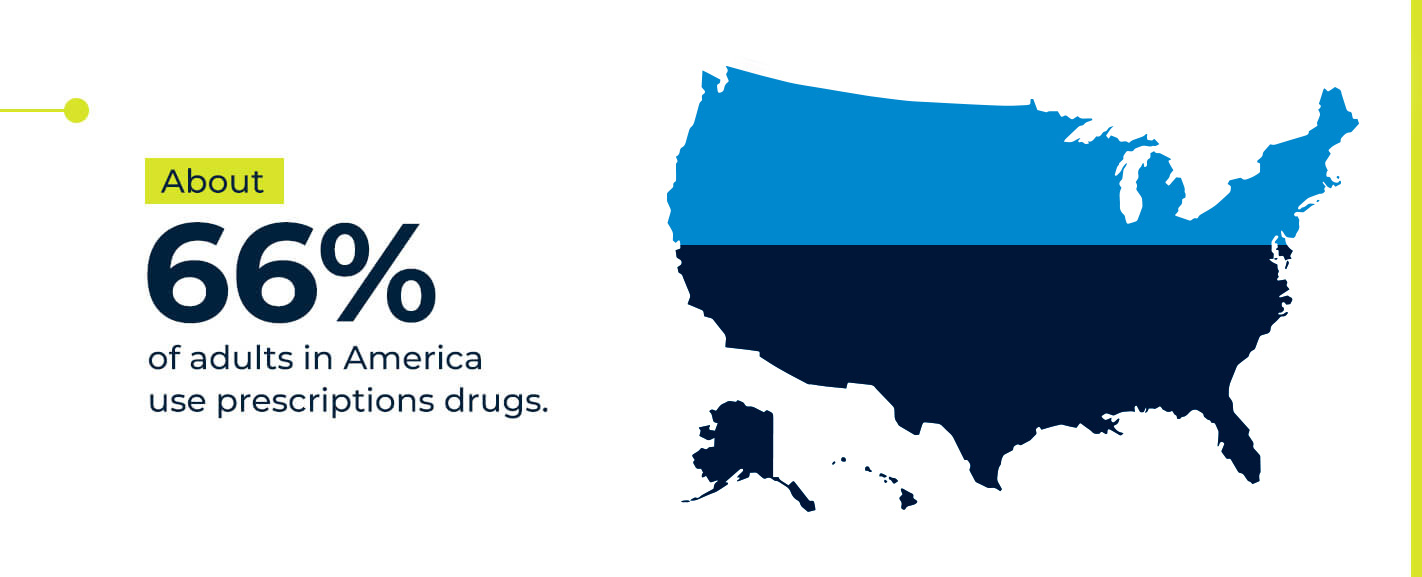

When you have an addiction to prescription drugs, it can have various adverse effects on your health and personal life. Like many other addictions, prescription drugs alter a person’s brain chemistry and create a physical and psychological dependence on the substance. Once a person becomes addicted, their whole life will revolve around taking prescription drugs, and it can become difficult to quit without professional intervention.
Below, we’ve compiled valuable information about prescription drugs, the signs and symptoms of addiction and the various types of treatment available. Continue reading to learn how to get professional help for yourself or your loved one.
Prescriptions drugs are medications doctors prescribe to treat various physical and mental health conditions. When a person takes these medications as prescribed, they can help them feel better. However, misusing these drugs can result in various adverse physical and mental effects and the potential for overdose.

Prescription drug abuse has become a significant concern in the United States. About 66% of adults in America use prescriptions drugs. In 2020, 5.8% of people over 12 misused prescription drugs.
There are multiple different types of prescription drugs, including:
Each of these medications has unique side effects, and misusing these drugs can change how your brain works, alter your ability to make good decisions and make it challenging to practice self-control. Once these medications change your brain function, they have a high potential for abuse and addiction. Once a person develops a prescription drug addiction, they’ll likely need professional help to quit using the drugs and improve their well-being.


Overcoming a substance misuse disorder is hard, but you don’t have to struggle alone. Find supportive, evidence-based treatment at Gateway Foundation.
While there are multiple types of prescription drugs, the signs of prescription drug abuse are generally the same. Like other addictions, abuse of prescription drugs has many identifiable signs you can use to determine if you or a loved one needs help:
While the signs of prescription drug use are usually the same, the symptoms vary based on what type of medication a person is taking.
Doctors often prescribe opioids as painkillers, but people can also find them through other means. The opioid epidemic in the United States is arguably the most well-known example of the outcomes of prescription drug misuse. When a person misuses opioids, they’ll experience symptoms such as:
Medical professionals will prescribe CNS depressants to individuals who struggle with insomnia, anxiety disorders or seizures. These medications slow brain activity and induce a sense of calm throughout the body. A person who abuses CNS depressants will experience various symptoms, including:
A doctor might prescribe a prescription stimulant to someone with attention-deficit hyperactivity disorder (ADHD) to make them feel more alert and energetic. These medications also improve a person’s ability to focus on tasks. When a person abuses these drugs, they can experience:
While some of these symptoms overlap, each type of prescription drug has a unique effect on the body.
Any person can become addicted to prescription drug addiction, but certain factors increase the risk. Prescription drugs are already highly addictive due to their potential for physical and psychological dependency. When other risk factors come into play, a person can quickly get addicted to these medications.
These risk factors include:
If a person has one or more of these risk factors and starts using prescription drugs, there’s a high potential for addiction, which can have various adverse effects on a person’s life. Prescription drugs can quickly alter the brain’s functions and turn into addiction before you realize it happened.


Gateway Foundation offers customized, evidence-based recovery plans to support your recovery and ongoing healing.
If you’re prescribed medication for a physical or mental ailment, the drug will come with information outlining the list of short- and long-term effects. However, if you take prescription medication without a doctor’s approval, you may be unaware of these effects. Even people who take these medications under a doctor’s supervision can potentially abuse them if they’re not properly educated about the associated risks.
Once a person starts taking prescription drugs, they’ll experience the short-term effects almost immediately. The effects will vary depending on whether someone is taking these medications as prescribed or abusing them.
Some of these effects include:
Once a person starts using prescription drugs regularly, they put themselves at risk for the long-term effects of addiction. Prescription drugs alter our brain chemistry and affect communication between the central nervous system. Once these changes happen, the brain will start to tolerate the drug, and your body won’t be able to rebalance itself without the drug.
Taking prescription drugs for an extended period can cause various symptoms, such as:
Many of these long-term effects can drastically impact a person’s quality of life. Once a person reaches physical and psychological dependence on prescription drugs, they’ve become addicted to the substance and often need professional help to detox.
Admitting you need help for addiction can be challenging. Fortunately, a professional prescription drug addiction center can help you get your life back on track and help you overcome the challenges related to addiction. Some people need help identifying when they need assistance, as they might not have a clear idea of how addiction affects their lives.
A few signs that indicate it’s time for treatment include:
If you notice any of these signs in yourself or a loved one, it’s time to seek professional treatment. A prescription drug addiction treatment center can help you improve your quality of life and help you overcome your addiction.


Don’t let your substance misuse continue to wreak havoc on your life. Start your recovery today.
Addiction treatment must be personalized to each individual’s unique circumstances to ensure they’re getting the most out of their care and have the best chance at a successful recovery. It’s crucial to abstain from drug misuse in a safe way. Quitting a substance “cold turkey” can result in harmful side effects, so it’s important to do so in a healthy way under professional supervision.
With this in mind, multiple types of treatment exist for prescription drug addiction, including:
People who have become addicted to prescription drugs have developed a physical and psychological dependence on said medications. If they suddenly stop taking the drugs, they’ll experience various withdrawal symptoms, such as:
One of the types of treatment for prescription drug addiction is medication-assisted treatment (MAT), which helps patients manage their symptoms to focus on their treatment. Doctors will prescribe the medication and keep you under 24/7 supervision to manage your symptoms and ensure your safety.
Before you’re prescribed any medication, you’ll undergo a full medical assessment to determine if you have any additional physical or mental conditions. If you’re prescribed any medication to help with withdrawal and cravings, you’ll have adequate support and guidance to ensure you don’t develop a secondary addiction.
Residential inpatient care allows patients to recover from prescription drug addiction in a safe and sober environment. Patients can also benefit from medication-assisted treatment with access to 24/7 care and supervision.
Inpatient care can be helpful for anyone with substance use disorder, but it’s best for individuals who don’t live in a sober or safe environment. For example, someone might live with family members who use prescription drugs, which can be challenging for someone in the middle of treatment. Residential treatment allows patients to get away from their triggers and focus on treatment with access to ongoing support and care.
Outpatient care is another way to treat prescription drug addiction and is suitable for people who have responsibilities to maintain outside of treatment, such as childcare or work. Outpatient programs are also an excellent option for people who have a safe and sober environment at home with a robust support network that can help them avoid temptation and triggers.
Outpatient care provides more flexibility since you can participate in treatment at varying intensity levels. Some people may attend therapy for eight hours a day on the weekdays and go home once the day ends. Others may participate in the meetings for a few hours in the afternoon once they get off work.
Regardless of the frequency, all patients have access to the same quality treatments as those in an inpatient program. The only difference is you can go home at the end of the day to process new information in a familiar environment.
A major component of addiction treatment is therapy, which you’ll participate in regardless of whether you’re in inpatient or outpatient care. Therapy can help you rewire your thinking and develop a deeper understanding of yourself and your addiction. The objective is to help you stay motivated in your recovery, identify ways to overcome triggers or cravings, set goals for the future and improve your overall well-being.
Multiple types of therapy are used to help individuals overcome prescription drug addiction, including:
Once you complete treatment, it’s essential to stay dedicated to your recovery to prevent a relapse. A relapse prevention program can help you maintain your sobriety long after treatment, even when you encounter a stressful or triggering situation.
An addiction specialist will help you identify the factors that could be contributing to relapses, such as work-related stress or financial strain. Once you’ve identified these factors, you’ll map out responses to these situations. For example, you can call a member of your support group or sponsor when you’re feeling stressed and close to relapse so they can remind you why it’s essential to stay committed to your recovery.
Your relapse prevention plan will also include coping skills you can use in stressful or triggering situations, including journaling, hiking, yoga or meditation. You’ll talk with an addiction specialist about aftercare programs, such as 12-step group therapy.


Don’t let your addiction continue to poison your life. Start your recovery journey today.
If you’ve never participated in rehab before, you might not know what to expect. Below, we’ve outlined the prescription drug addiction treatment process, so there are no surprises when you enter treatment.
Before you can begin treatment, you’ll go through an assessment process to determine the level of care you need. An addiction specialist will need to determine the severity of your addiction by asking you questions about your prescription drug use. They’ll ask you questions such as:
When answering these questions, it’s essential to be honest about your experience so the addiction specialist can help you curate a plan suited to your needs. They’ll likely also ask you questions about your mental health to determine if you have a co-occurring disorder that requires simultaneous treatment. They’ll also determine how your addiction has affected your personal life, such as your personal and professional relationships.
Once the assessment is complete, you’ll work with your addiction specialist to create a personalized addiction treatment plan. This plan will include various types of treatment to help you overcome addiction and improve your well-being.
The next step in the process is detoxing from prescription drugs. If you’re struggling with withdrawal symptoms, you may qualify for medication-assisted treatment, which can help you feel more comfortable as you’re detoxing.
You’ll be monitored by medical staff the entire time, so you feel safe and secure as your progress through treatment. Methadone and buprenorphine are often used in treating prescription drug addiction because these medications can trick the brain into thinking you’re still taking drugs, so you experience less severe withdrawal symptoms.
If you enroll in inpatient care, you’ll be able to detox in a safe and sober environment that prevents relapse. You’ll also have support from medical staff who can help you work through your uncomfortable physical and psychological withdrawal symptoms.
While medication can help, it’s only one part of treatment. While you’re detoxing from prescription drugs, you’ll participate in various forms of treatment to help you get to the root cause of your addiction.
As you detox from prescription medications, you’ll start treatment, which consists of various therapies to help you learn how to manage your triggers and overcome stress. You’ll learn valuable coping skills and how to restructure your thoughts to make positive behavioral changes that will help you achieve your goals.
Some of the types of therapy you might encounter during treatment include:
Part of addiction treatment will also include participation in recreational activities, which will help you learn how to enjoy life without prescription drugs. Recreational activities can help promote whole-body healing and encourage healthy lifestyle changes once you re-enter sober society. Different recreational activities include yoga, art, music, hiking and exercise.
The final step of the addiction treatment process is aftercare planning. Addiction is a chronic illness that requires constant care to sustain long-term sobriety. An aftercare plan will include the many steps you can take to take care of yourself after treatment and stay committed to your recovery.
Depending on your situation at home and the severity of your addiction, part of your aftercare plan might include sober living homes. These homes act as a transitional period between treatment and independent living. Sober living homes can be an essential part of the process for people who live in triggering environments. These homes also provide individuals with structure, such as daily chores and work-life responsibility. Residents will be able to start to gradually transition into independent living while they participate in a relapse prevention program.
An aftercare plan might also include participation in 12-step support group meetings. These meetings allow individuals to connect with others at various stages of recovery and help them feel less isolated throughout their journey. You’ll be able to discuss your challenges or voice your concerns without fear of judgment, as every group member is familiar with the toll addiction can take on a person’s life. You can also rely on members of your support group to hold you accountable to sustain your recovery well after your official treatment has ended.
If you’ve never participated in addiction treatment before, you might not be aware of the many benefits these facilities offer. Below are some of the most notable benefits of seeking treatment from a professional addiction treatment center:
Rather than going through addiction alone, an addiction treatment center can help you through each step of the recovery process and set you up with the tools to help you succeed. If you or a loved one is struggling with prescription drug addiction, seeking treatment from an addiction treatment center can help you improve your quality of life and work on goals for your future.
If this is your first time seeking professional addiction treatment, you might have some questions about the process. We’ve compiled some of the most frequently asked questions to help you understand what you can expect from treatment.
Multiple medications are used in MAT to help with withdrawal symptoms and prevent relapse. When you go in for your assessment, an addiction specialist will help you determine what medication is right for you. Medications that are often used to assist with prescription drug misuse treatment include methadone and buprenorphine.
These medications can help trick the brain into thinking you’re still taking drugs so you don’t experience severe withdrawal symptoms. They can help you focus on your recovery and prevent a relapse once you’ve exited official treatment. Medications can also be used to treat physical and mental ailments, so you can spend more time focusing on counseling and setting goals.
If you’re considering medication-assisted treatment, ensure you talk to your addiction specialist about any additional medications you may be taking.
The Mental Health Parity and Addiction Equity Act (MHPAEA) requires insurance providers to offer mental health and addiction treatment coverage in the U.S. Insurance companies are required to provide the same level of care for mental health conditions and addiction as they would physical conditions.
It’s essential to know what your insurance provider covers. For example, if you have limited coverage for physical conditions, you’ll have limited coverage for mental health and addiction. However, if you have insurance of any kind, you can assume you’ll have coverage for your addiction treatment.
At Gateway Foundation, we accept all major insurances, so you don’t have to worry about paying out-of-pocket for the entirety of your treatment. If you’re unsure where or how to start, we can help you find coverage for various rehab programs.
If you have a loved one who’s struggling with prescription drug addiction, you likely want to help them reclaim their life and reach sobriety. One of the best things you can offer your loved one is your ongoing support. You don’t want to enable their behaviors, but you want them to know you’re here to help them when they need it.
Approach them calmly and assure them you don’t blame them for their addiction. Allow your loved one to talk about their challenges and let you know you’re there to listen without judgment. Your support will help them feel less alone and more willing to receive help.
When you feel ready, you can recommend that they seek help from a professional addiction treatment center. Let them know how these facilities can help improve their life and overcome addiction challenges.
If your loved one is resistant to care, try talking to a professional for their advice or to see if they might help you with an intervention. They have plenty of experience assisting people in seeing the importance of addiction treatment and can be a valuable tool to assist you in getting your loved ones the help they need.
The length of treatment you need will vary based on the severity of your addiction and how long you’ve been misusing prescription drugs. If you choose an inpatient program, your stay can vary between 30 to 90 days. Outpatient treatment can last even longer, depending on the frequency of your treatment.
Once you complete your assessment, an addiction specialist will help you determine the length of your care and any necessary follow-up treatments you might need once you’ve completed inpatient or outpatient care. These treatments can include continued participation in a 12-step program or sober living home. Addiction is a lifelong disease, and while there’s an end to official treatment, it requires long-term care to achieve the best results.
Before you meet with an addiction specialist, you should prepare for your first appointment or stay at an inpatient facility. If you have the necessary information available beforehand, it’ll make transitioning into the treatment process seamless.
Some things you should prepare ahead of time include:
If you’re going into an inpatient program, there should be a list of items you can and can’t bring. Take a careful look at this list and ensure you pack the essentials, so you’re prepared and comfortable during your stay.


We are here to help! The fastest way is to call us.
877-377-2027Seeking professional treatment for prescription drug misuse can help you get your life back and improve your physical and mental health. At Gateway Foundation, you’re never alone. We’ll help you through each step of the treatment process and help you create a personalized treatment plan so you can rest assured you’re getting the level of care you need and deserve.
With Gateway Foundation, you’ll have access to multiple levels of care and ongoing support from our staff. We’re dedicated to helping you get your life back on track and helping you create goals for a successful future. Take the first step toward recovery and contact us today to get started or learn more about our prescription drug addiction treatment center in Chicago, Illinois.

patients receive customized prescription drug abuse treatment at Gateway, and there are several rehab programs to choose from. There are also many locations in and around the Chicago area, as well as flexibility so that our Addiction Treatment programs can suit your schedule. At each of Gateway’s prescription drug abuse treatment centers, you can expect therapies such as:
Explore the latest news and resources from Gateway’s thought leaders, clinicians and alumni.


We use cookies to give you the best experience on our website. If you continue without changing your cookie settings, we assume that you consent to our use of cookies on this device. You can change your cookie settings at any time but if you do, you may lose some functionality on our website. More information can be found in our Privacy Policy.
